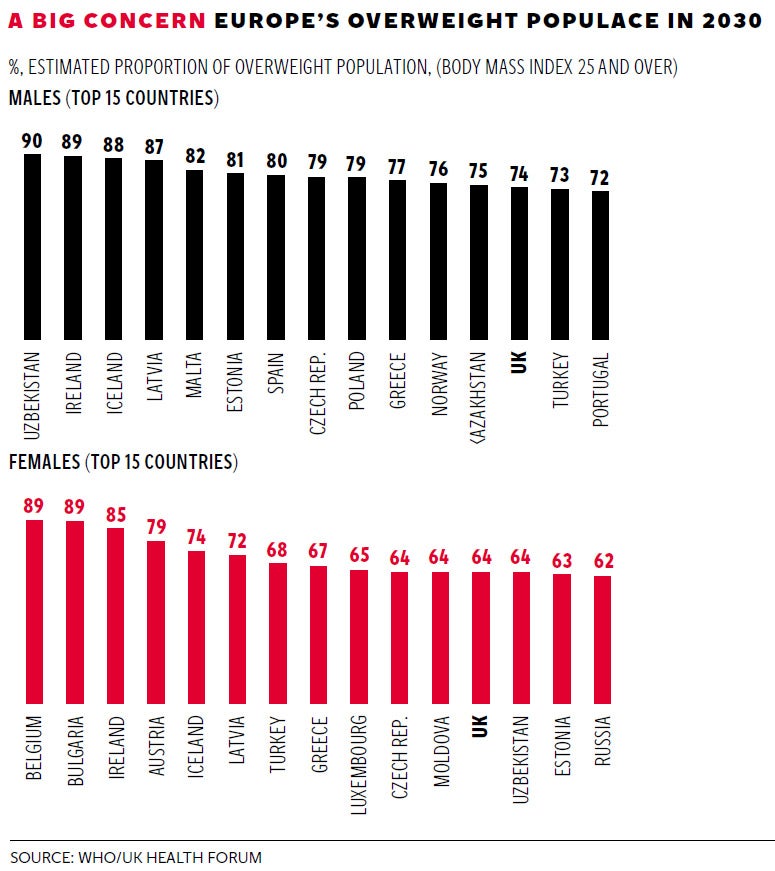Three in every four British men will be overweight by 2030, says World Health Organisation
In some of Europe’s worst-performing countries, including Ireland, the WHO predicts that 'almost all adults' will be overweight within 15 years

Your support helps us to tell the story
From reproductive rights to climate change to Big Tech, The Independent is on the ground when the story is developing. Whether it's investigating the financials of Elon Musk's pro-Trump PAC or producing our latest documentary, 'The A Word', which shines a light on the American women fighting for reproductive rights, we know how important it is to parse out the facts from the messaging.
At such a critical moment in US history, we need reporters on the ground. Your donation allows us to keep sending journalists to speak to both sides of the story.
The Independent is trusted by Americans across the entire political spectrum. And unlike many other quality news outlets, we choose not to lock Americans out of our reporting and analysis with paywalls. We believe quality journalism should be available to everyone, paid for by those who can afford it.
Your support makes all the difference.Three in every four men and two in every three women in the UK will be overweight by 2030, according to new predictions from the World Health Organisation.
Rates of both overweight and obesity will continue to mount throughout Europe, the estimates from the WHO and the UK Health Forum reveal, suggesting that recent campaigns to improve diet and curb sugar and fat intake are still not having an impact.
In some of Europe’s worst-performing countries, including Ireland, the WHO predicts that “almost all adults” will be overweight within 15 years.
The UK will remain in the top third of European nations, in terms of rates of overweight and obesity.
Seventy-four per cent of men and 64 per cent of women are predicted to be overweight – with a body mass index (BMI) of more than 25 – by 2030, up from 70 per cent and 59 per cent in 2010, the figures suggest.

Thirty per cent of women and 36 per cent of men are predicted to be obese, with a BMI over 30.
However, Ireland, by 2030, is predicted to an even greater problem, with rates of overweight as high as 89 per cent among men and 85 per cent among women.
Experts said that the figures, based on a number of different data sources, were only predictions based on current trends, but still pointed towards “an obesity crisis of enormous proportions”.
They also appear to counter recent, more positive figures, from Kings College London, that appeared to show levels of obesity among young children in England beginning to “level off”.
Dr Laura Webber, director of public health modelling at the UK Health Forum, who co-authored the study, to be presented at the European Congress on Obesity in Prague this week, said that radical action across all layers of society was needed to improve the projections.
“There was some evidence of a plateau in young boys’ obesity levels in England but otherwise we are seeing increasing rates,” she said.
“There needs to be a whole-society approach to this. We’d like to see greater regulation: sugar taxes for instance. People also need to know what they’re eating. Better labelling of foods and understanding what goes into processed foods is vital, as are continued reformulations of processed foods.”
Tam Fry, of the National Obesity Forum, said that declining living standards since the economic downturn had harmed efforts to drive down obesity rates among the poor.
“The less well-off haven’t got the money to buy the good food, often don’t know how to cook, and are ever more reliant on processed foods,” he said. “Processed food will inevitably be less than healthy and in the end will drive up those obesity figures.
“You only have to see that 1 million people use food banks to know what a parlous state a lot of people are in. There is a wider gulf now between the social classes, in terms of obesity prevalence.”
Steep rises in overweight and obesity rates are also expected in Greece, Spain, Austria and the Czech Republic. Even countries, such as Sweden, which had previously had higher numbers of adults of healthy weight, are predicting increases, with 26 per cent of Swedish men expected to be obese by 2030 compared to 14 per cent in 2010.
Few countries will see stable or decreasing rates. In Holland, among the best performers, less than half of men are predicted to be overweight in 2030 and only eight per cent obese, compared to 54 per cent and 10 per cent in 2010. Rates of obesity in women are also predicted to fall from 13 per cent to nine per cent among women.
Join our commenting forum
Join thought-provoking conversations, follow other Independent readers and see their replies
Comments